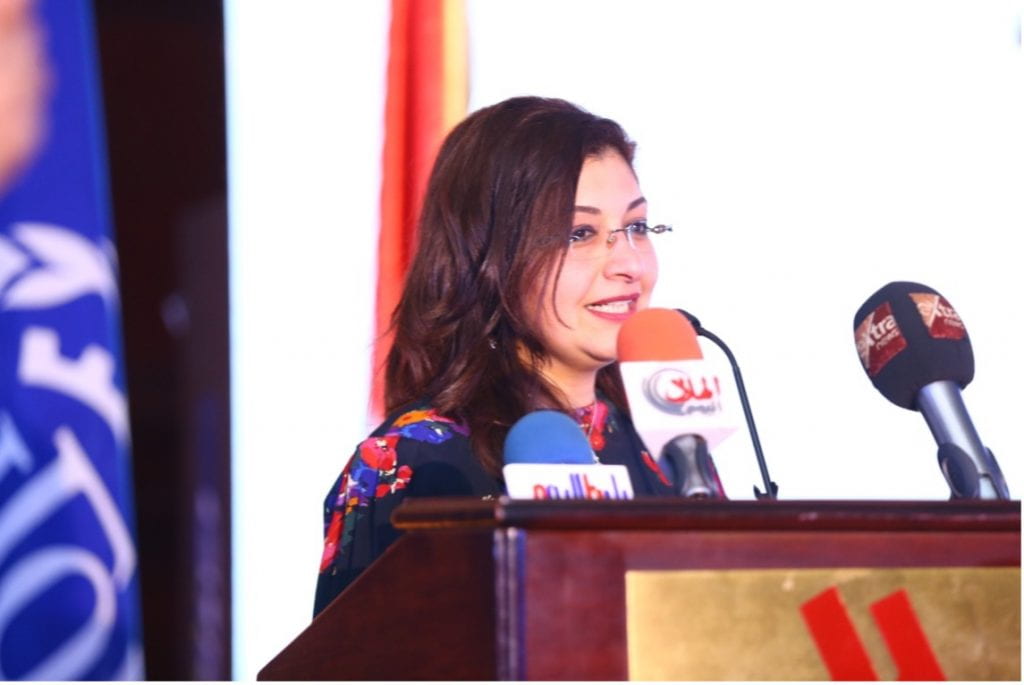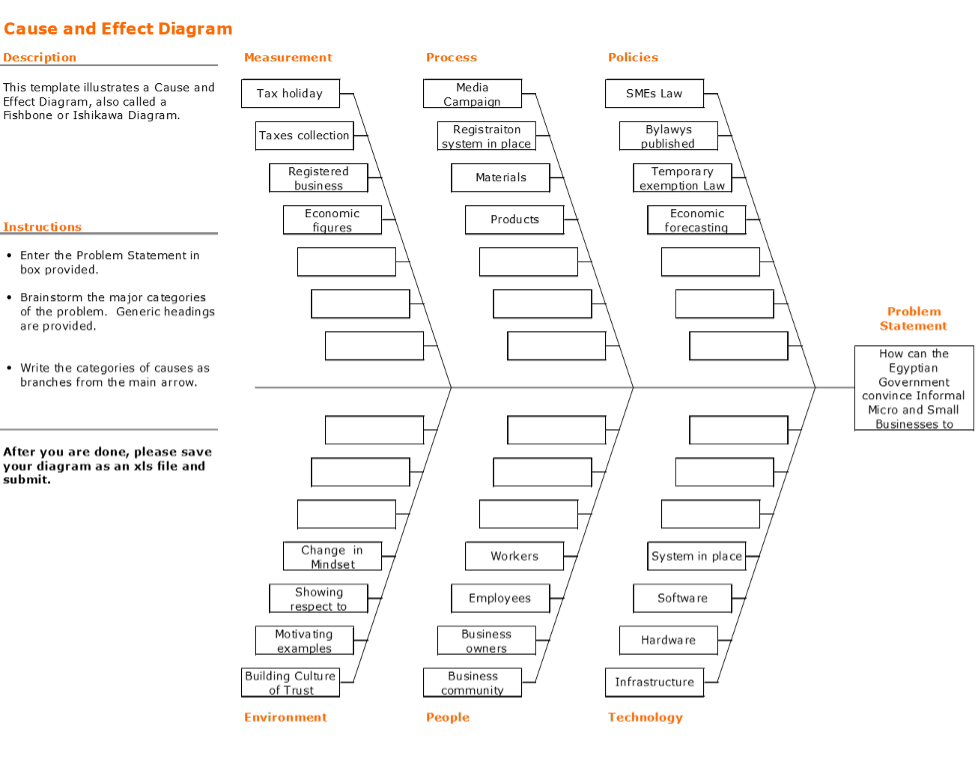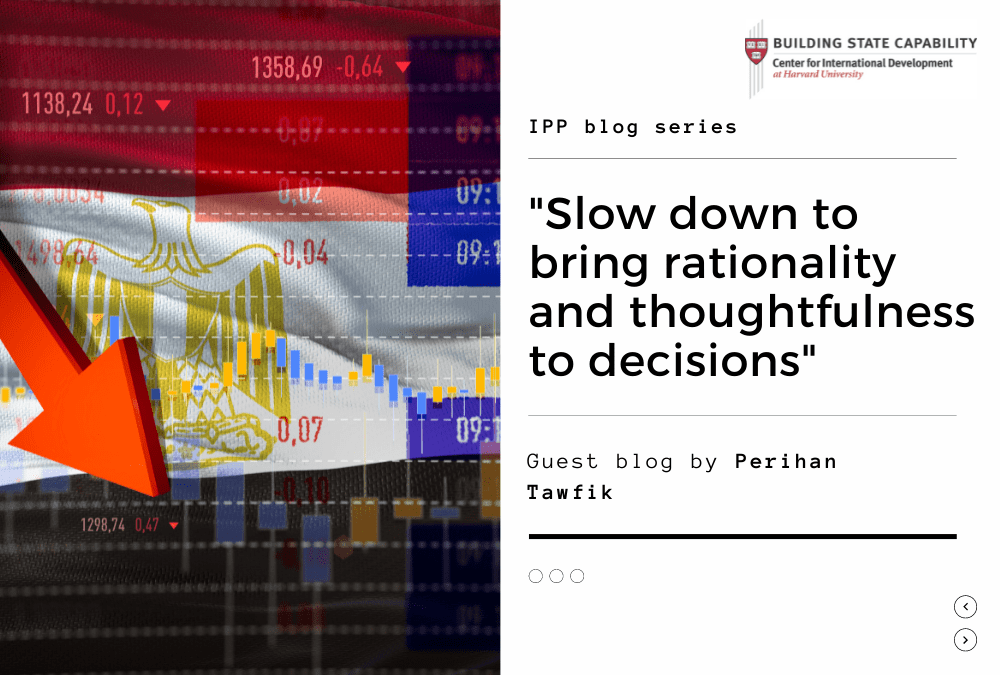Guest blog by Perihan Tawfik
Being an Egyptian Woman, a holder of a master degree of the Public Policy and Public Administration from the American University in Cairo (AUC, 2007), member of the AUC Public Policy Hub (2018) and working for the International Labor Organization (UN Specialized agency) encouraged me to think about enrolling in a public policy course at Harvard’s premises.
Applying to “Implementing Public Policy”, blended course, at Harvard Kennedy School was a very interesting challenge from March to December 2020 until the moment the course turned to be an online course then the challenge started to grow bigger in me. I had an initial expectation to learn from the Harvard premises experience and from the interaction with professors and mates especially that I considered the online part as an introduction and conclusion while the body of the course is mainly the in presence-week.

Starting the course, I was impressed from the methodology that is new to me and I was surprised from the number of participants that need a huge team to manage the requirements and respond to queries. I was amazed for the duration of the course from the immediate responses and positive attitude the team has demonstrated. I would like to thank Salimah, Amber, and Alison for their commitment and for their kindness throughout the course.
Registering to HKS platform and checking the course calendar, I appreciated very much the organization: announcements, modules, discussions, people and conferences. I liked the idea of having videos, podcasts, readings and Q&As. Although I thought, the course is slow for my pace but I discovered that I needed to figure out the learning pace reasoning that increased through applications. I grasped the methodology and got used to the pace thinking about other peers in the course with different time zones.
I learned from my peers in team 13 who were kind, nice, helpful, informative and serious. The team 13 was meeting regularly sharing our policy challenges work progress and exchanging on different levels. I consider this peers’ mechanism is very successful although the team members might have matched with other teams more than to be part of this team but it is an excellent mechanism used in IPP and we managed to be friends and exchange with each other.
My key learnings from this IPP2102 course are mainly about the way of thinking and using news approaches such as the Problem Driven Iterative Adaptation (PDIA) Approach that is based on breaking down the problem into root causes, identifying entry points, searching for possible solutions, taking actions, reflecting upon the learnings, adapt and act again. I learnt through this dynamic process that I would find the solution to my problem according to my local context. I learnt to celebrate small wins to feel motivated all along the journey until the problem is partially or totally solved. A main learning is that the problem may seem to be something and after analysis, it might turn to be another thing related to it. The choice of the team to work with is essential to guarantee success of the leader, the authorizer(s), and the team members’ harmony once they have one common goal to achieve.
To be a Leader is have a network of coordinated connections, ideas, and thoughts. Leadership is not related to a person but to a set of policy leaders to overcome the policy challenges with one person to orchestrate the connections among the different persons who by their turns move towards other persons who have connections to reach-out others.
On a personal level, I learnt – through one to one conversation and advice from Salimah – to slow down in submitting assignments and therefore I applied it at work to slow down in responding to queries. I used to think that being responsive is excellent but I learnt that taking my time might yield to better outcome than immediate reactions.
I think I learnt to slow down my pace “Slow down to bring rationality, and thoughtfulness to a decision”. My leadership personal narrative based on the narrative: I will: listen to others’ perceptions, engage people positively, consider group dynamics while preparing the process and draw a clear vision about where to be in the future for the perception.
I think I was applying the content without framing it as the 4Ps Framework for Strategic Leadership. I think that out of experience through the years, people gain management skills without learning them in a course or a textbook. I appreciate Rob’s class with all the engagement and positive energy he brought to the online class, not to mention how I appreciate Matt’s classes and responses to my queries. Rob and Matt are so inspiring!
The policy challenge is “how the Egyptian government can convince people having informal micro and small businesses register their informal activities to be formal businesses so as to be considered as part of the Formal Economy”. I modified the title that was broad “Formalization of the Informal Sector in Egypt”. After deconstructing the challenge and drawing a fishbone diagram narrowing the perspective in terms of entry point although the same stakeholders might be involved in the process. I admit that constructing the problem after deconstructing it might lead to the same challenge but the way to look at it might differ in perspective or in entry point or even in the way of formulating the words of the challenged to be faced. I thought of different solutions but I think when involving stakeholders and listening to them then the solutions – even if I found them the same – will be better received and welcomed thinking it came up from the concerned persons. I was trained on the participatory approach for 12 years now and I have been part of many trainings but I did not see any materialize in a real action and solution: all were simulations only. I drew the Fishbone Diagram and modified it according to the guidance received from Matt and Dan. (Figure below)

I think the 7 iterations I have gone through taught me to compare the situation throughout the process in its different times in order to see clearer the small achievements and build confidence and show the learning curve. (Table below)
Learning new approaches made me curious to apply them on the different levels: I believe my approach to tackle problems changed already slowing down and responding after taking the time of thinking and trying to use the approaches, I learned. Fostering motivation is always a continuous mode that is to be kept all the way in order to reach positive solutions to any problem. I believe it is valuable to ‘create a safe space’ for my stakeholders/people which helps ‘progress loop’ idea keeping stakeholders connected. I need high ownership and high buy-in.
I will use the learning of this course in my work planning process as well as tackling any challenge I face at work using the team to work together towards achieving the goals we aim at.
My words of wisdom to share with fellow PDIA practitioners around the world: learning is a life journey that never arrives to its destination. Raising expectations, jumping into conclusion or judging without giving the time to understand do not advance or make progress. People have different paces, backgrounds, skills, attitudes and capacities, each has his/her value added to any process so give people chance to show themselves, guide them to the goal you want to achieve and show them your trust and make sure they will do their best. Trust me!
This is a blog series written by the alumni of the Implementing Public Policy Executive Education Program at the Harvard Kennedy School. Participants successfully completed this 6-month online learning course in December 2020. These are their learning journey stories.
Learn more about the Implementing Public Policy (IPP) Community of Practice and visit the course website to apply.
